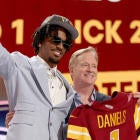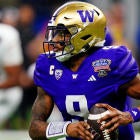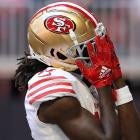
The game shouldn't have come down to a call, and that's key to remember if you're the Dallas Cowboys. With a new head coach, a slew of new assistant coaches and no minicamp or preseason, the well-hyped Cowboys looked out of sorts for much of their Week 1 battle with the Los Angeles Rams -- a team with continuity atop its pyramid. The defense eventually began to figure things out, as did the offense, but a maverick fourth down call combined with missed tackles and key drops on well-placed passes from Dak Prescott to give the Rams a narrow 20-17 victory in their SoFi Stadium opener.
All of that said, and all of it being true, it also wouldn't have been a Cowboys game without a controversial, game-deciding offensive pass interference call going in the other team's favor. Let it be known the two things were not mutually exclusive on Sept. 13.
Prescott, who was in the heat of a late push in an attempt to land ninth career fourth-quarter comeback and 15th game-winning drive, dropped back and tossed a rain drop into a shot glass with the Rams up 20-17 and only 31 seconds to play -- the pass falling right into the hands of a streaking Michael Gallup as he beat Jalen Ramsey en route to stumbling to the 11-yard line. The elation was immediate seeing as, at worst, the Cowboys were again in field goal position and able to force overtime.
The laundry on the field had other ideas, however, as the sideline official penalized Gallup for offensive pass interference, which ultimately ended the game for the Cowboys.
Rough OPI call against the Cowboys #DALvsLAR pic.twitter.com/EULfho58sn
— Bad Sports Refs (@BadSportsRefs) September 14, 2020
"Just watching it live, it looked like two guys hand fighting," Mike McCarthy said after the game. "I thought it was well-executed. I was surprised there was a call there, either way. ... Obviously disappointed in the call, particularly at that point in the game. I thought they let both teams play tonight, and you just don't usually see that -- particularly at a critical point in the game."
NFL official Tony Corrente vehemently disagrees with McCarthy and all who would challenge the call on the field.
"I can tell you it was clear and obvious on the field, of a hand into the opposing player," Corrente said. "A full arm extension that created separation," Corrente said. "In all situations that would be called. We're not going to allow that at any time of the game."
For what it's worth, 'Sunday Night Football' rules analyst Terry McAulay, who is also a former league official with 20 years experience and Super Bowl credits on his resumé, agrees with McCarthy and not Corrente.
"You want to see a clear, extended separation, and I see he's got his arm out there, but I just don't see him forcibly push him off," McAulay said during NBC's broadcast.
For his part, Gallup hinted at the call being attributable to home field advantage for the Rams.
"Honestly when you're playing away, you've got to make sure you know you're playing against the refs and the other team," he said. "It is what it is. They're going to call it like they want to call it."
As noted in the beginning of this article, the Cowboys did themselves no favors by failing to consistently defend the screen pass, or by two drops from tight end Dalton Schultz in critical situations after the team saw Blake Jarwin leave with what is feared to be a torn ACL. The inability to get consistent pressure on Jared Goff also helped torpedo their hopes of stealing a win on the road, and you could also arguably point at their decision to go for it on fourth-and-5 instead of kicking the field goal to tie as yet another reason they're starting the 2020 season with an 0-1 record.
While it all matters, so does officiating that was questionable in both directions on Sunday Night but, in the end, nailed the Cowboys casket shut just as they tried to sit up in the coffin.
A no-call on an obvious roughing the passer against Dallas after a blow to Goff's helmet was repaid with a missed one against Aaron Donald on Dak Prescott for the same infraction, and was one of several errors the officiating crew made in front of a national audience, which included awarding the Rams a timeout after an initial delay of game penalty was assessed in the first quarter -- allowing them to reset for what turned into a touchdown versus being forced backward on third and inches and possibly into a field goal situation.
It wasn't supposed to be subjective. It was literally, by rule, a delay of game.
Timeout?
— Patrik [No C] Walker (@VoiceOfTheStar) September 14, 2020
This sequence led to four more points for the #Rams. Final score: 20-17.
I’m not saying, but I’m saying. pic.twitter.com/qsWj8D0mcz
It's just as well Corrente doubled down when even McAulay disagreed with the call, because an apology from the league isn't going to suddenly flip the L into a W going into Week 2. McCarthy has no choice but to get back to work and reboot for the visiting Atlanta Falcons, and he won't have Jarwin or starting middle linebacker Leighton Vander Esch to help him, adding to his level of difficulty.
He can't control the accuracy of the officials, but he can control the level of play by the Cowboys, and the latter failed the team as much as the former did in Week 1 -- players like Prescott, Ezekiel Elliott, Aldon Smith and rookie cornerback Trevon Diggs notwithstanding.
It's fair to view it all as a preseason game in early September for a coaching staff who've only physically been around their players for a month before the regular season kicked off, and roundly unfair to suddenly equate the loss to some semblance of the decade-long Jason Garrett era in Dallas. How quickly McCarthy can get the rubber to the road after a tumultuous first offseason with the Cowboys will ultimately dictate how far they go in 2020, but so will NFL officials, as football fans know all too well.






















